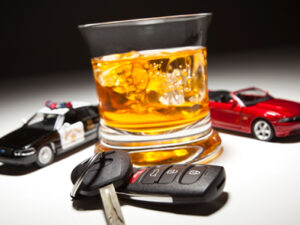If you live in Maryland you may have noticed the roadside billboards that read “Buzzed driving is drunk driving.” This may or may not be true depending on your tolerance for alcohol. What is definitely true is that you don’t have to be knock-down-drag-out-drunk to face steep penalties. Maryland has a two-tier drunk driving statute. The lower of the two offenses is Driving While Impaired (DWI) and the more severe is Driving Under the Influence (DUI). Both carry the possibility of jail time, the loss of your privilege to drive and fines. The only sure fire way to stay safe, protect others on the road and avoid punishment is to not drive at all if you have alcohol in your body.
A police officer who pulls you over and suspects that alcohol is affecting your driving may ask you to submit to a field sobriety test to determine if your coordination, vision or judgment is impaired. You will also be asked to provide a breath sample to determine your Blood Alcohol Content (BAC). Urine tests are less common to measure for BAC but can detect the presence of other substances in your bloodstream such as marijuana or other drugs.
A police officer cannot force you to take a field sobriety test. However, there are automatic penalties for choosing not to submit to the tests. If you refuse to take the field sobriety test, your license will automatically be suspended for 120 days for your first refusal. If your job or lifestyle requires driving on a daily basis, you may be able to avoid the license suspension by installing an ignition interlock system, which requires blowing into a breathalyzer before your car will start, for an entire year. If you refuse to take a field sobriety test during a second or third suspected alcohol-impaired driving situation, your license may be suspended for an entire year. Upon DUI or DWI conviction, there may be additional penalties including a fine of up to $1,000 and a year in prison.
If you take the field sobriety test, your BAC is less than .08, and you show other signs of impairment, you can still be charged with DWI. If you blow a BAC of .08 or higher, your charge will be elevated to a DUI. If you are under age 21 (Maryland’s legal drinking age) and blow a BAC of .02, you will be charged with a DUI as an adult. Your criminal exposure is even worse if you have minor children in the car at the time or are involved in an accident that injures someone.
The field sobriety tests are not easy even if you are sober. They involve acts of coordination and following sometimes vague instructions from the police officer. Even if you only feel buzzed, it is likely that you will fail at least some parts of the test resulting in a charge that you will have to defend in court. If convicted of DWI you could receive up to two months in jail and a fine of up to $500. For a DUI the potential penalties increase to a year in jail and/or a $1000 fine. In addition to these penalties you could lose your license, have it suspended or be required to install an interlock device on your car that requires you to blow into it every time you want to start your car. Subsequent offenses carry even more severe penalties.
The most serious consequence of drinking and driving is the threat that an impaired driver poses to his or her own safety and the safety of others on the road. Add the potential legal consequences to the equation and it’s easy to see how “just a few drinks” can turn into a nightmare with serious legal consequences. Using a sober driver is the best way to avoid a DWI or DUI conviction. However, if you have been charged with either of these acts, an attorney at Ferrante & Dill, LLC can help you navigate the criminal justice system.
Disclaimer!
This blog post that is published by Ferrante & Dill is only available for informational purposes and should not be considered legal advice. By viewing these blog posts, the reader understands there is no attorney-client relationship between the blog publisher and the reader. The blog post should not be used as a substitute for legal advice from a licensed professional attorney, and we recommend readers to consult their own legal counsel on any specific legal questions concerning a specific situation.






